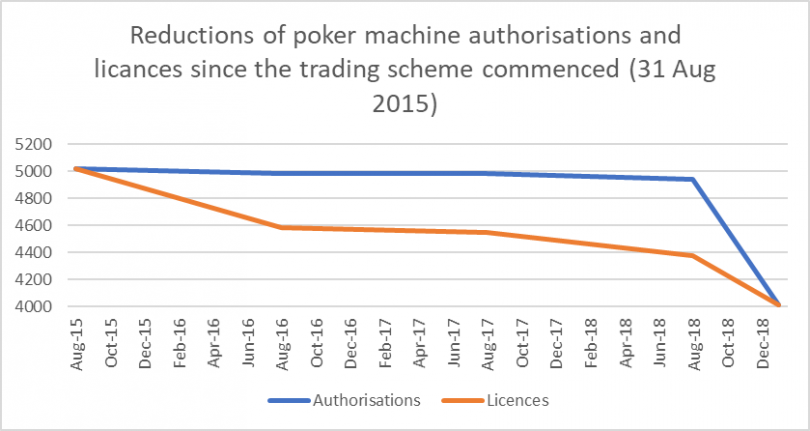
A pokies-free Canberra could soon be a possibility.
Canberra now has fewer pokies in venues across Canberra.
This week, the ACT Government announced that it has almost achieved its 20 per cent reduction target for poker machines in venues across the Territory. It’s an important step in reducing the harm caused by gambling products and will make a difference. However, it’s only the first step and more needs to be done to reduce harm across the community.
Gambling harm is something that has been troubling ACT residents for some time. There was plenty of discussion about gambling during the last Territory election in 2016. Following the ACT election, the parliamentary agreement contained a number of commitments to start addressing gambling harm. This included a commitment to reduce the number of poker machines from around 5000 to around 4000 – a 20 per cent reduction. A program of voluntary surrender was announced, with incentives built in to encourage clubs to participate in the scheme. This built on a trading scheme that had been introduced in 2015.
This initiative had significant support. In 2017 the Canberra Gambling Reform Alliance (CRGA) commissioned a community survey, which found that 61 per cent of the community supported a decrease in machines in the ACT, while 40 per cent of these respondents believed there needed to be a big decrease.
Since the introduction of the trading scheme in the ACT, there had not been a great deal of change until recently. The recent reduction in authorisations has been primarily due to the end of the voluntary surrender program. This program offered incentives to encourage clubs to surrender authorisations and ended on 30 January 2019. After that, the Government was going to be able to start compulsorily acquiring authorisations to meet the target.
With the deadline reached for the voluntary scheme, data released has shown a significant drop in the number of authorisations – almost 1000 from a peak of more than 5000. This means that the ACT Government has almost reached its target, with just 12 to go at the end of the voluntary program.
While this is good news, there hasn’t been a dramatic change in the number of poker machines coming off the floors of venues. This is because most of these authorisations were not being used, and were rather ‘zombie licenses’, not attached to actual machines. All told, this program has seen around 235 pokies being removed from the floors of venues. Given this, it’s a fairly a modest first step along the path to reducing access to products that we know can be harmful and are easily accessible across our suburbs and neighbourhoods.
This scheme has cost around $14 million, provided in both cash and other incentives, and has enabled clubs to make the move and divest their poker machines. One of the most positive results of the scheme is the decision of at least one club to completely remove poker machines from their venue. This means that Canberra residents now don’t have to choose between visiting their local club and avoiding the pokies. It mirrors decisions being made in other jurisdictions where increasingly venues are deciding to get rid of all their poker machines. In Victoria, clubs in Geelong and Collingwood have recently removed poker machines from venues. In fact, Geelong’s Boss said that “operating poker machines clashed “with our mission and our values”.
The industry should be recognised for its engagement in the program. The Government should be congratulated for almost reaching its target of reducing poker machines. We need to remember however that the job has just started. There is still much further to go to reduce gambling harm in our local community. CGRA is calling for a much more significant reduction of poker machines – halving the number from the 5000 figure reached in the mid-2010s. We need to shift access so that these products are not so easily accessible across our suburbs and neighbourhoods.
In addition to reducing the number of machines, CGRA is also calling on Government to better regulate these products that we know can cause harm. This includes introducing meaningful bet limits to reduce the amount of money that people can lose quickly.
I think the community expects the ACT to be a leader in gambling harm reduction rather than lagging behind many other jurisdictions as we do now. I think much more needs to be done to reduce gambling harm in Canberra. What do you think?
CGRA is an Alliance of community organisations and individuals who are actively calling for significant reform of gambling legislation to reduce gambling harm. Rebecca is a co-chair of the Alliance. She is a former member of the Gambling and Racing Commission Board and was an ACT Greens candidate in the 2016 Territory Election.





















